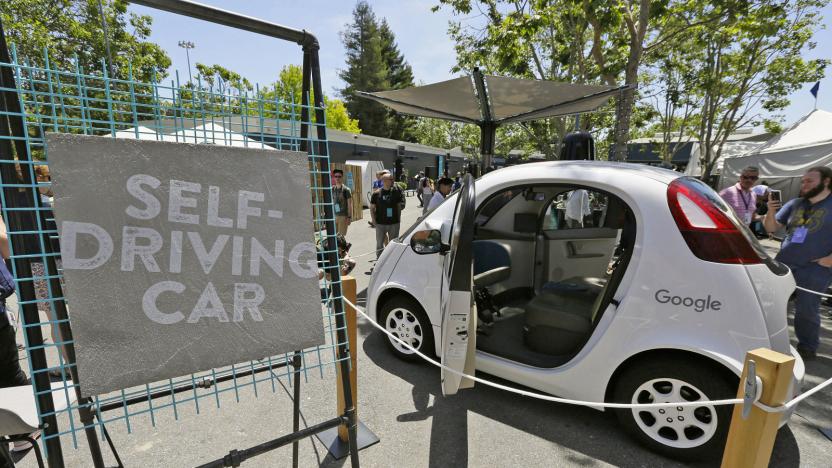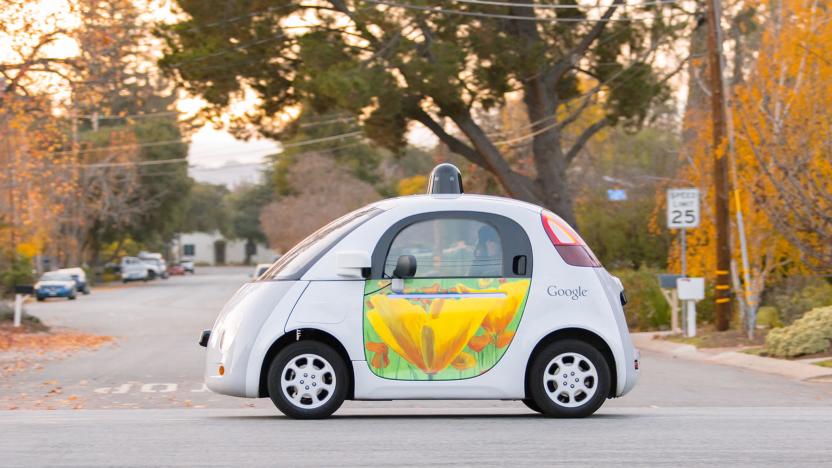TL16selfdrivetest
Latest

No one wants to test self-driving cars in Ontario, Canada
Governments may be racing to approve self-driving car tests on their roads, but that doesn't mean that companies will always line up. Case in point: Ontario. The Canadian province greenlit autonomous vehicle testing on its public roads as of January 1st, but hasn't had a single company apply to test in the 6 months that followed. Ontario's Ministry of Transportation tells Reuters that there has been interest, but that flies in the face of what some companies are saying in the short term. Honda has no plans, for example, while part supplier Magna International is currently limiting its tests to private test tracks.

Faraday Future aims to test self-driving cars in Michigan
Faraday Future isn't just talking a big game when it mentions plans for autonomous features in its cars. Michigan's Department of Transportation tells the Detroit News that FF not only asked about how to apply for plates that let it test self-driving cars, but has applied for three manufacturer plates since. While the company isn't confirming anything (the plates are to test "prototypes and features," it says), it's safe to say that at least one of those vehicles won't always have a human at the wheel.

Inside Honda's ghost town for testing autonomous cars
On the edge of the San Francisco suburb of Concord sits a ghost town. Dilapidated buildings and cracked roads are framed by overgrowth and slightly askew street signs. The decommissioned 5-acre portion of the Concord Naval Weapons Station that once housed military personnel and their families is now home to squirrels, jack rabbits, wild turkeys and Honda's mysterious testing lab for autonomous vehicles.

Google's self-driving cars to face their toughest test yet
Google is taking its self-driving cars to a fourth city in an expansion of its ongoing development. The latest location for testing is Phoenix, Arizona, which is significantly more arid than any city previously used as a proving ground. Speaking to Reuters, Jennifer Haroon, Google's head of business operations for the self-driving car project, noted that the desert conditions will further the company's understanding of "how our sensors and cars handle extreme temperatures and dust in the air." Modified Lexus SUVs have already begun to map the Phoenix area, checking for street layouts, lane markers, traffic signals and curb heights.

Google's self-driving cars hit the rainy streets of Washington state
Google is expanding its self-driving car test to the rainy and hilly city of Kirkland, Washington. In fact, citizens of the Seattle suburb have probably already noticed one of the company's Lexus RX450h SUV driving around over the past few weeks mapping the roads. The rest of the fleet of autonomous vehicles will be hitting the road next month.

Ford first to test self-driving cars in Michigan's fake city
The University of Michigan recently built the 32-acre "Mcity" proving ground so that automakers could test autonomous vehicles with zero risk to the public. Since the faux city is in US car country (and far from Silicon Valley rivals like Google), it's only fitting that it was broken in by a small Dearborn outfit: Ford. The automaker tackled Mcity in its latest Fusion Hybrid self-driving car, freshly equipped with four LiDAR sensors for real-time 3D mapping. While Ford has tested its vehicles extensively on public roads, "every mile driven [at Mcity] represents 10, 100 or 1,000 miles of on-road driving in terms of our ability to pack in the occurrences of difficult events," said U of M professor Ryan Eustice.

Self-driving cars will be tested on Canadian roads in 2016
Hey, Canadians -- you're not going to sit on the sidelines while the US experiments with self-driving cars. Ontario's Ministry of Transportation has approved autonomous vehicle testing in the province (the first in the country) starting on January 1st, 2016. It's not clear who'll be the first to trial robotic cars, but it won't be surprising if Google and big automakers are part of the mix. This is an important step forward, regardless of who shows up. Besides taking Canada a bit closer to hands-free transportation, the clearance also prevents at least some Canadian companies from heading south to test their self-driving tech. When there are nearly 100 related projects in Ontario alone, that's a pretty big deal. [Image credit: Justin Sullivan/Getty Images]

Google tests self-driving cars in Austin, Texas
Plenty of folks in Austin, Texas have spotted Google's distinctive self-driving Lexus cars recently, and now we know why. The company revealed that it's now rolling the vehicles in downtown Austin in order to "(test) our software in different driving environments, traffic patterns and road conditions." While Google could also test its self-driving cars in Nevada and elsewhere, Austin is the first city outside of Mountain View where it's actually done so. The reason? "We've loved how much Austin embraces innovation," a Google spokesperson told the Austin American-Statesmen. She added that with Google Fiber and several company offices in the city, it was a natural fit for self-driving cars.

Google's unique self-driving cars hit the streets of Mountain View
Google has been testing self-driving cars on the roads of Mountain View for a while, but now the company's own models are hitting the streets. Last month, Google announced that its rather unique vehicles that were built specifically to drive themselves would begin testing on public roads this summer and now they're logging miles. During the trials, speeds are capped at 25 MPH and all of controls you'd usually find in a car (steering wheel, accelerator and brake pedal) are on-board in case the driver passenger needs to take over. However, these cars were designed to not have all of that stuff, so perhaps we'll see testing sans controls soon enough -- if the state of California allows, of course. The software that handles the navigating is the same tech that powered the company's fleet of Lexus SUVs outfitted to drive themselves. If you'll recall, that stable of vehicles tallied over a million miles, so the technology has quite a bit of road experience already.

Virginia opens up 70 miles of highway for driverless car testing
Google and other companies developing self-driving vehicles now have another state to consider for public road testing: Virginia. It has earmarked 70 miles of highway in the northern part of the state -- now called the "Virginia Automated Corridors" -- for the project, which will be overseen by the Virginia Tech Transportation Institute (VTTI). Any car slated for testing in the Mother of States must first undergo an initial trial on the institute's smart roads before they're unleashed in public. VTTI director Myra Blanco told Richmond Times-Dispatch that the state will make the process easier for interested parties compared to other states. But if the car does pass the trial, it will still have to be manned by a driver during the actual tests, just in case the vehicle's system malfunctions.





